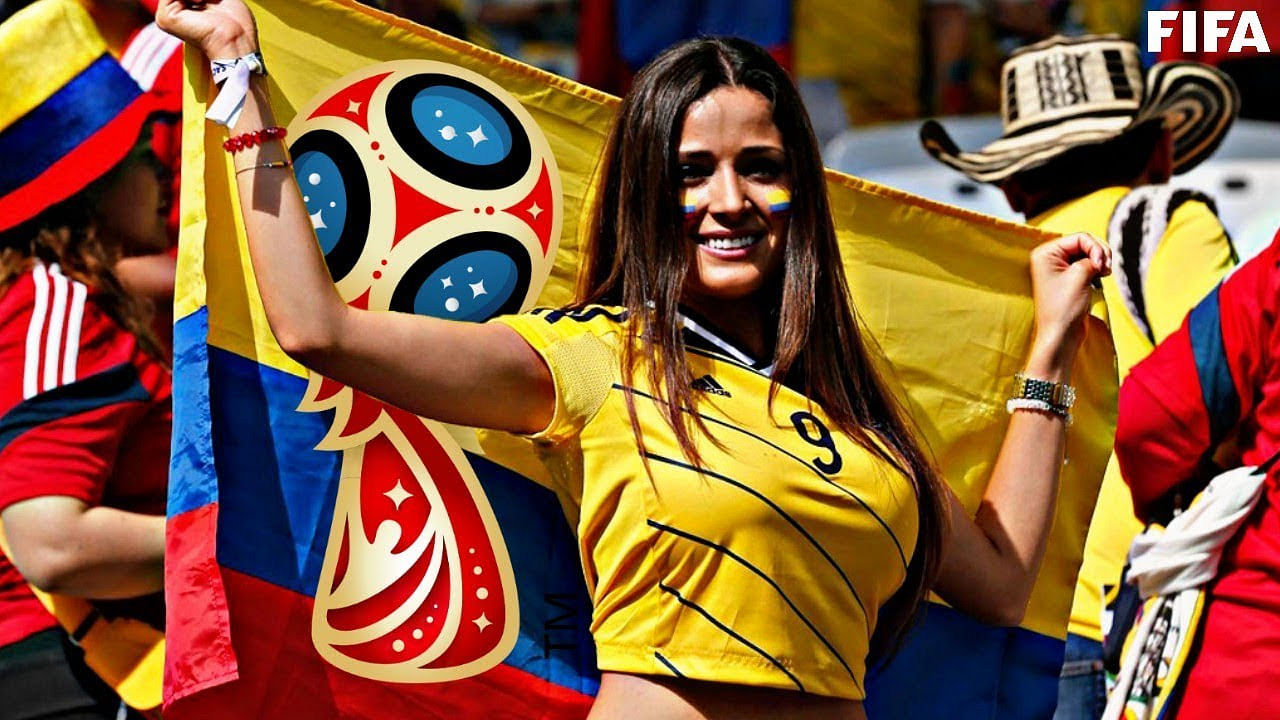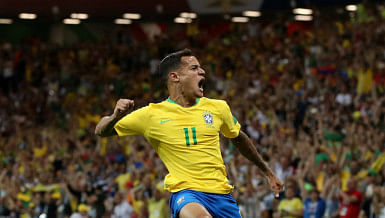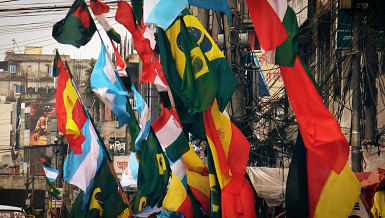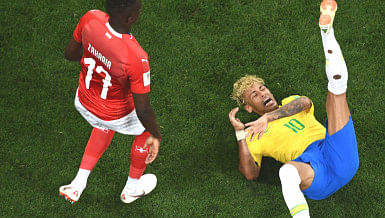FIFA World Cup Russia 2018 (Promo)
The video include Football Skills, Tricks , Highlights , Dribbling & Goals , from Cristiano Ronaldo , Neymar Jr , Lionel Messi , Paul Pogba , James Rodríguez , Luis Suarez and more…

FIFA World Cup Russia 2018 (Promo)
The video include Football Skills, Tricks , Highlights , Dribbling & Goals , from Cristiano Ronaldo , Neymar Jr , Lionel Messi , Paul Pogba , James Rodríguez , Luis Suarez and more…
France captain Hugo Lloris has announced his retirement from international football at the age of 36, three weeks after his country lost the World Cup final on penalties to Argentina in Doha.
"I have decided to stop my international career, with the feeling that I have given everything," Tottenham Hotspur goalkeeper Lloris said in an interview with French sports daily L'Equipe published on Monday.
"I think it is important to announce this now, two and a half months before the start of Euro qualifying."
Lloris, who made his international debut as a 21-year-old in a friendly against Uruguay in November 2008, bows out after becoming France's most-capped player during the World Cup.
He overtook previous record-holder Lilian Thuram's mark of 142 appearances and finished with his 145th cap in the final, which France lost 4-2 on penalties after an epic 3-3 draw at the end of extra time.
"I have really been thinking about it since the end of the World Cup, but there has been something deep inside of me for maybe six months now and which grew during the competition, leading me to make this decision," Lloris said.
Former Nice and Lyon goalkeeper Lloris captained France to victory at the 2018 World Cup in Russia.
He played at seven major tournaments in total, including Euro 2016, when France lost in the final to Portugal as hosts.
France's back-up goalkeepers at the World Cup were 37-year-old Rennes veteran Steve Mandanda and Alphonse Areola of West Ham United.
However, the replacement for Lloris as France's starter is set to be the 27-year-old Mike Maignan of AC Milan, who missed the World Cup due to injury.
- 'Go out at the top' -
"There comes a time when you need to step aside. I have always said the French national team does not belong to any one person," Lloris said.
"There is a goalkeeper who is ready (Maignan), and I need a bit more time for me, for my family and for my children.
"To have been the France goalkeeper for 14 and a half seasons is a big deal, but it is also mentally exhausting and I hope clearing some time for myself will allow me to keep playing at the highest level for a few more years."
He added: "I prefer to go out at the top, having helped France get to a World Cup final."
Lloris' decision comes after coach Didier Deschamps -- in charge since 2012 -- signed a new contract to remain in the position through to the 2026 World Cup in North America.
"I must, we must, respect his decision even if he still had his place in our team, as he demonstrated during the last World Cup," Deschamps said in a statement.
"A great servant of the France team is bowing out and I want to pay tribute to his exceptional career.
"Beyond all the records that his talent and professionalism enabled him to break, beyond the essential role that he played in our greatest victories ... Hugo is a remarkable person on a human level."
The next assignment for Deschamps and France is the qualifying campaign for Euro 2024 in Germany, which begins at the end of March with a double-header against the Netherlands and the Republic of Ireland.
They will also play Greece and Gibraltar in Group B, with the top two teams advancing to the finals which will take place from June 14 to July 14 next year.
A month ago, if someone had predicted that France and Croatia would play the World Cup final in Russia, most of us would have dumped it as an impossible option. But here we are with that spectacularly different reality -- the Les Bleus and the Blazers lining up for today's final at the Luzhniki Stadium.
France are no rank outsiders -- they are a proven force and won the World Cup in 1998. But Croatia have certainly lived up their nickname -- blazing their way to their first-ever World Cup final. And if Croatia win, they will be the ninth nation to lift the coveted trophy.
Do they deserve it? Let's have the facts -- they played three knockout games on the trot for 120 minutes and more importantly they did it the hard way. Croatia won their semifinal against England in style – coming from a goal down to win it 2-1 in extra time, with Mario Mandzukic slamming the winner on 109 minutes. Not only that, they won their three group stage games which included a thumping 3-0 win against two-time world champions Argentina.
This Croatia team have so far not only demonstrated that they have got the qualities, if not pedigree, to go all the way to win the title. They will be up against a team they lost thrice against two draws in the last five meetings, but Croatia's inspirational coach Zlatko Dalic said past statistics would not win his opponents today's final.
“Statics, tradition and head to head -- I don't buy those. Tradition is there to be demolished. We do not mind who is on the other side of the pitch. We have come here to enjoy the moment and give our best. We deserved to play in the final; we want the world to watch Croatia play; we want most of the world to root for us. This is important. We will give our all, we will enjoy our football and whoever is the better team may they win,” Dalic said ahead of the final.
After that semifinal heart-break against France in their maiden World Cup appearance in 1998, Croatia lurched from bad to worse in the following three editions of the World Cup. They made it to Russia at the last moment but since then it has been a spectacular journey for them with Luca Modric playing the key role in a very experienced side.
They might have played more minutes and got less rest compared to France and they have so far proved that they love to grind their way out of a hole. This tough mentality might prove handy for them against an extremely talented yet raw French side, who had only one tough game against Belgium in the semifinal. France were successful in defending a 54th-minute Umtiti lead against Belgium. But the ploy of sitting back against a vastly experienced Croatia side might prove costly for them.
France will bank on the brilliance of Kylian Mbappe to create something on the break. But the key player for the Les Bleus would once again be again Antoine Grizemann and it will be interesting to see who controls the midfield.
France captain Hugo Lloris is well aware that this Croatia team is not only very experienced but have the quality too. He also reminded that they would have to be at their best if they want France to lift the World Cup for a second time and put behind the home disappointment of the Euro 2016 final against Portugal.
Twenty years ago, France joined the exclusive group of World Cup winners, defeating Brazil in the final. Croatia made their first appearance in that year and bowed out, suffering an agonising 2-1 semifinal defeat against France. They will get a second chance at redemption. And if they can do that, it will be gift to the dreamers. Croatia is a county of only four million people, but Dalic promised that the seismic wave back in Croatia would be even bigger than Brazil and Argentina if they win the final.
It was the first time that Video Referee Assistant (VAR) technology was used in a World Cup final but controversial refereeing decsions ensured that a spectacle of the calibre of the final might have been marred by inconsistencies.
Argentine referee Nestor Pitana, who was also took charge of the first match played between Russia and Saudi Arabia was handed the duty to bring the curtain down on the showpiece event.
Both France’s opener and their second goal which handed them the lead in the second half were controversial in their own rights.
The first goal would follow after Antoine Griezmann was fouled outside the area. Griezmann looked to shimmy his way past Marcelo Brozovic, perhaps going down easily under the midfielder's attentions to set up a set piece in a very dangerous area. Replays looked unconvincing as Griezmann looked like he either accidentally tripped himself or went down against minimum contact.
VAR did not intervene due to the guidelines which suggests that it should only intervene in case of goals, penalties, direct red cards and mistaken identity. It was not a penalty or a red card incident so VAR did not intervene.
Controversy followed the actual scoring of the goal as well after Mario Mandzukic had scored the first ever own goal in a World Cup final. French midfielder Paul Pogba appeared to be in an offside position when Mandzukic headed into his own net.
The Croatia forward had jumped higher than Pogba and interfered with the play. Notably former Spain goalkeeper Iker Casillas had his say on the matter over twitter.
“Honestly, I do not understand the use of VAR very well,” Casillas wrote.
“The referee points to a foul that wasn’t on Griezmann and France’s goal comes from that action and nothing happens.”
Uruguay and Barcelona striker Luis Suarez agreed with the former Real Madrid goalkeeper and wrote: You are right Iker and Paul Pogba was offside when he ‘participates’ in the play.
While the controversies in the first goal may get overlooked, it was France’s second goal ten minutes before half-time which might have changed the tide of the match after Croatia had fought back with a equalizer from Ivan Perisic.
Blaise Matuidi went up for a near-post header, but missed the nod-on. Instead, the ball landed near the defending Perisic's arm, prompting wild gesticulations from French players, pleading for a handball. The ball went out of bounds and was originally ruled a goal kick for Croatia, but the officials decided to use the VAR to check the play.
The referee put his finger to his ear, and after what felt like an eternity, signalled that he would consult the VAR. Whether it was deliberate, or whether Perisic's hand was in an unnatural position was not clear, even after repeated viewing of the incident.
Even when he appeared to come to a decision, the referee quickly spun on the spot and returned to the screen for one quick look before awarding a penalty to France from which Griezmann scored.
It looked highly unlikely that it was a case of deliberate handball and might have even been a case of ball to hand.
Alan Shearer led the criticism of the refree while talking at the BBC studio, claiming Pitana’s decision-making had been “ridiculous” and that both pivotal decisions were, in his opinion, wrong.
“They’re losing this game to a free-kick that wasn’t a free-kick, and penalty that definitely wasn’t penalty,” Shearer said.
Jurgen Klinsmann agreed, while Rio Ferdinand added: “Two bad decisions have really turned this game on its head.”
It was the biggest game in the biggest showpiece event in the world. A game which should have been lit up by the footballing excellence of the participating teams. In a way, that probably was the case. France had the most talented squad in the tournament and they managed to showcase their abilities. However, football is a crazy game where moments can decide the outcome of a match and before the second France goal, Croatia were looking like the better side. Whatever the result, maybe controversies should not lead discussions in the aftermath of such an important game, which is what happened after the final.
Croatia coach Zlatko Dalic stated outright what he felt regarding the controversial penalty call following his side’s 4-2 defeat to France in Sunday’s World Cup final, saying : “You don't give a penalty like that in a World Cup final.”
A debatable penalty awarded with the use of FIFA's new video replay system proved a turning point in the World Cup final on Sunday as debate focused on erronous referee calls.
France and Croatia were level at 1-1 in an evenly contested match when Argentine referee Nestor Pitana was alerted to a possible handball ten minutes from half time and, after checking the off-field screen, he decided Croatia's Ivan Perisic had handled. While there is no doubt that the ball did hit the Croatian’s hand, the focus will remain on whether the handling of the ball was intentional.
Antoine Griezmann converted the penalty and France went on to win 4-2. Even after the use of the Video Assistant Referee (VAR) system, it remained a highly contentious call. Many former players called the awarding of the penalty a dubious decision with former England and Liverpool defender perhaps rightly suggesting that ‘It’s the referee’s mistake, not VAR! VAR is just the replay of an incident.’
The decisions proved to be a turning point in the match as France’s influence grew following their second goal. Dalic said he thought such a decision had no place in a game of such magnitude.
“We played well but the penalty knocked the wind out of us and after that it was very difficult," Dalic said after congratulating France on their victory. "I just want to say one sentence about that penalty: You don't give a penalty like that in a World Cup final.”
The Croatia coach conceded that his team had let in two ‘soft goals’ but lamented the fact that things did not go their way when they were in a good position to fight for the match.
“We wanted to win the World Cup so much, but that's football," he said. "The French did not surprise us; we let in two soft goals coupled with an own goal and a penalty.
“What we had in terms of luck in this tournament, we lacked today. When you concede four goals, you cannot expect to win the game.”
Neverthless, Dalic went on to congratulate France and praised his team’s effort after they gave a vastly talented French side a run for their money.
“I congratulate France on their title. We played well in the first 20 minutes, we controlled the game. Then there was an own goal from a set play. We came back to life, dominated and then the penalty was given,” Dalic said.
“I have to congratulate my players, it was maybe the best game we played in this tournament; we controlled the match but we conceded. Against such a strong side as France you must not make mistakes. We are a bit sad, but we have to be proud as well for what we’ve done.”
Paul Pogba wanted his own star and 19-year-old Kylian Mbappe wanted to make an everlasting impression on his World Cup debut. Their wishes were granted as France lifted the World Cup with a 4-2 win against Croatia in the final at the Luzhniki Stadium in Moscow yesterday.
Both Pogba and Mbappe actually settled the fate of the final even before it had progressed to the last quarter, scoring the third and fourth goals respectively in the space of six minutes after the break. Mbappe won the best young player award, an achievement that matched the feat of great Brazilian striker Pele.
For Croatia captain Luka Modric the golden ball was there to proudly aloft. He raised it up amidst thunderous applause from the stands; it was not necessarily only Croatian voices that cheered. But his stony face only portrayed the visage of a heartbroken man who watched from a distance amidst pouring rain as France danced with that glittering piece of glory.
France are deserving winners. True, they were under pressure in the first half and they may have been a bit lucky to win a penalty. But they showed the quality of true champions and mercilessly hit their opponents on the break, which Croatia failed to negotiate.
It was a story of two contrasting halves. Croatia were on the ascendency in the first 45 minutes while it France asserted control after the break. When Argentine referee Nestor Pitana blew the final whistle, the most powerful image was Les Bleus coach Didier Deschamps being toasted by his young charges. Deschamps truly built the bridge after 20 years. He won it in 1998, France's first-ever World Cup triumph. And after the disappointment in the Euro final two years ago when they lost to Portugal, the France legend guaranteed another moment of national pride.
The Luzhniki final saw the first three goals scored every 10 minutes after Mario Mandzukic headed the ball into his own net off an Antoine Griezmann free kick from outside the left-hand box in the 28th minute. Incidentally, it was France's first shot on target, a floater deep into the far post where Croatia's hero of the semifinal against England soared above everybody. It was a header from a class striker that rattled the top left-hand corner, but unfortunately though the Juventus forward was oblivious that he was defending his own goal.
France were lucky to take the lead against the run of play, with Croatia not only starting brightly but also dictating possession. The pall possession ratio of 68-32 in Croatia's favour was reflected in the stands, where the red-and-white stripes overwhelmingly dominated the blues.
Croatia got the deserved equaliser in the 28th minute with Ivan Perisic firing in a scorching left-footer. It was originated from another dead-ball situation after Perisic won a free kick about 35 yards from the French goal. Modric lobbed an intelligent ball wide where Sime Vrsaljko headed it across the penalty area. It dropped for Perisic, who made a little space before unleashing an unstoppable diagonal drive into the bottom right-hand corner.
The third goal came after a lot of deliberation and the referee had to take the assistance of VAR, which ruled Perisic had handled the ball in the forbidden zone. Griezmann was again the initiator with a corner from the same corner flag. N'golo Kante headed it at the near post which struck the stretched hand of Perisic, though unintentionally. Griezmann stepped up to convert the penalty, sending Danijel Subasic the other way.
France went into the lemon break with a fortuitous 2-1 lead. But they returned only to bury the game beyond doubt with Pogba and Mbappe finding the net in the space of six minutes and that too after a pitch invasion by members of Pussy Riot that stopped the final for a few minutes.
Pogba increased the lead in the 59th minute from a rebound after his first attempt was blocked. It was then the turn of Mbappe to become only the second youngest player after Pele to score a goal in the final. The 19-year-old France prodigy drove a spectacular low shot after a little shimmy on the top of the box.
Hugo Lloris's blunder in the 69th minute allowed Croatia to make it 4-2. The France captain unnecessarily waited with the ball before Mandzukic closed in on him and poked the ball into the net as the goalkeeper was trying to cut across him. But that goal served only as a consolation for Croatia, who turned up in their maiden final with great expectations but once against came unstuck against a team they lost 2-0 to in the semifinal 20 years ago.






Leave your comments